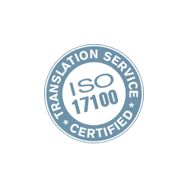Machine Translation vs Human Translation: Which is best?
There’s no doubt that machine translation has transformed the way in which individuals and businesses translate text from one language to the next.
We never have to have that awkward conversation with a waiter on holiday when we can’t read the menu thanks to machine translation services such as Google Lens.
Although, for all it’s benefits, machine translation is far from the finished article.
With human translation, we are able to identify and contextualise words and phrases that have multiple meanings, cultural and grammatical differences, as well as, spotting many other nuances that make machine translation less accurate.
With a number of global businesses cutting costs in the current climate, it should come as no surprise if your translation budget is one of the first resources to get the snip, opening the door for machine translation.
At the end of the day, the choice between machine and human translation comes down to how influential your translation projects are.
In this article, we’ll dissect both machine translation and human translation, as well, as revealing the most significant pros and cons of each translation process.
Machine Translation
Machine translation is carried out by a machine like a computer, tablet or phone. They use Artificial Intelligence (AI) to continuously learn and apply learning to translation.
There are a few types of machine translation, including rule-based, adaptive, statistical, and neural. Neural Machine Translation (NMT) poses the biggest threat to human translation.
There are many free machine translation engines around like Google Translate, Microsoft Translator, DeepL Translator and Yandex Translate. You input the text, select your source language and target language, and it produces its translation.
Machine translators do not properly contextualise the content they’re fed. They use an automatic translation structure to break down text for direct translation and then compile it together again.

Benefits of Machine Translation
Machine translation is favoured by those looking for a rapid response. Here are the main pros:
Speed
Machine translation is attractive for time-sensitive but low-stake tasks. It outputs translations almost instantaneously. NMT has evolved to better understand how humans communicate with one another, so there’s an increasing likelihood that correct translations will be made.
Cost-Effective
Many translation tools are completely free or are very cheap, so it’s useful for simple tasks that would be too pricey and unnecessary to outsource to a professional translator.
Drawbacks of Machine Translation
For all the ever-improving and innovative translation software, machine translation is by no means a carbon copy of human translation. Here are the most significant drawbacks:
Accuracy
Machine translators provide barely more than basic word-to-word translation which has a direct effect on the accuracy and grammatical structure of certain languages and their nuances. This gives a disjointed, unnatural flow to the content so they are not true, accurate translations.
Not Appropriate for High-Priority Content
When translating legal documents or composing international marketing materials (either in print or for SEO purposes), then machine translation should be avoided. You need something error-free that paints your business in the best light and keeps you on the right side of the law.
Difficult to Localise for Different Languages
What is localisation? Put simply, localisation is the process of adapting content to target a specific market or locale.
Whilst machine translators have a “translation memory” which helps them learn new turns of phrase specific to a geographical area, the algorithm is usually slower to keep up-to-date. A fluent human speaker has a much better grasp on nuances of language and culture in a specific area, which a machine does not.
Even simple things like distinguishing between British vs American English can make a world of difference in how appealing your company is to consumers in different regions.
Human Translation
Professional human translators will either be native speakers or at the very least fluent in the language you desire – this is critical for projects that require extra care and nuance.
If the content you need to translate is of high importance then we highly recommend you get in touch with a professional translation agency like Global Language Services.
If a machine translation tool comes across a word or phrase it can’t compute, it tends to overlook it. Human beings are able to use their own interpretation and experiences to pick up on the intricacies of linguistics, plus they can collaborate with others.

Benefits of Human Translation
Here are some of the perks of employing human translators.
Collaboration with Professional Translators
Unlike machine translation, you are able to ring up or jump on a Skype call with your human translator to go over any queries you have or to iron out complex project details to make sure there are no misunderstandings.
The Intricacies of Style and Tone
Human translators not only translate the words given to them, but they are able to shape it so that the style and tone are consistent with your needs. It will read like a human with personality has written it rather than a robot – essential for persuading clients or communicating to a certain target audience.
Cultural Sensitivities & Differences
Each country has its own culture intertwined in their language – human translators are able to account for unique cultural norms and create pieces that are culturally sensitive as well as linguistically accurate.
Difficult to Localise Machines for different languages
On a similar note, if you’re looking to localise your marketing for a new target audience, humans are much better equipped to help than machines. A machine’s algorithm will have a much poorer understanding of the fast-changing definitions and interpretations of certain words and phrases across the globe. Humans consider the context of a translation piece and can tailor it accordingly.
Drawbacks of Human Translation
Despite being the overriding leader in terms of producing high-quality translations, there are a few drawbacks attached to human translation. These can include:
Price
Human translation tends to cost more than machine translation. The cost-effectiveness depends on the individual project – where there are legal fines or the potential to lose business through poor translation, it makes pure sense to pay a translation agency to do the work properly the first time.
Deadlines
As with any good piece of work, time and effort are usually taken to ensure excellency. If you need the aid of a human translator, you’ll need to account for their labour time in your own workflow.
Summary
In spite of the enhancements of machine translation, this translation technology has still got a very long way to go until it can truly be compared to human translation in terms of quality and accuracy.
That being said, machine translation is a great resource for individuals and businesses looking to save time and money on very small scale pieces of work which will not have legal or financial repercussions if done inaccurately.
If the source text that you intend to translate holds any value of importance then it’s a no-brainer to spend a little extra for a human linguist to produce a piece that guarantees accuracy and high-quality.
Whether you’re on the lookout for an agency to provide you with expert translation or interpreting services, GLS offers highly skilled and friendly professionals so don’t hesitate to contact us.





